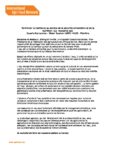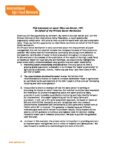
Water
The CFS commissioned the High-Level Panel of Experts to issue a report on “Water for Food Security and Nutrition” for 2015. The PSM contributed actively in the consultations and in the development of the decision box, as well as in the negotiations that took place during the CFS in October 12-14, 2015. Water for Food Security and Nutrition is not being discussed in the current biennium.
The following PSM speakers spoke from the floor during the roundtable discussion in plenary on October 12, 2015:
-
Water – PSM Statement – Roundtable
Statement by Cesarie Kantarama, vice-president of the Fédération des Agriculteurs de l’Afrique de l’Est, on behalf of the PSM at the Roundtable on Water for Food Security and Nutrition (October 12, 2015)
Download -
Water – PSM Statement
Statement by Nico van Belzen, IDF, on behalf of the PSM on Water for Food Security and Nutrition.
Download -
Water – PSM Statement – Roundtable
Statement by Brian Lowry, deputy general counsel with Monsanto Company, on behalf of the PSM at the Roundtable on Water for Food Security and Nutrition (October 12, 2015)
Download -
Water – PSM Statement
Statement by Jennifer Ragland, Director International Government Relations and Public Affairs, The Coca-Cola Company, on behalf of the PSM on Water for Food Security and Nutrition
Download

The Private Sector Mechanism is very concerned about the improvement of water management that will be required to make the necessary increase of food production possible. We believe that the international community should pay more attention to the essential contribution of water to food production throughout its value chain. To this end and in the context of the publication of the report of the High-Level Panel of Experts on Water for Food Security and Nutrition, we would like to highlight key areas where policy recommendations could greatly improve water stewardship:
- Improving water productivity and efficiency: In a context of potential stability of water resources available to agriculture, the only option to feed a growing global population sustainably is to increase the ‘water productivity’ of agricultural production. This challenge has been clearly recognized as imperative in the formulation of the global SDG Targets. This concept of ‘more crop per drop’ needs to be translated into effective action to meet the needs with concrete recommendations on means to stimulate water productivity in agriculture.
- The opportunities provided by water re-use: In view of achieving the agricultural component of the SDG Target 6.4 on water-efficiency, we believe that recommendations need to be made to increase wastewater reuse in agriculture to contribute to the achievement of the SDG Target 6.3 that aims at ‘increasing recycling and safe reuse globally’.
- The role of the private sector: The private sector is important in providing solutions to improve water management and to invest in research and development.
- Research, innovation and technology: The role of technology, best practices, innovation, and alternative methods of agriculture are fundamental in improving water management. Existing solutions such as irrigation including drip irrigation, drought-tolerant crops, hydroponics, aquaponics, recycling and reuse, vertical farming, desalination of seawater, and grey water use all provide effective options for water stewardship. It is important that proper policies encourage investment into agricultural technologies that are more efficient and sustainable.




